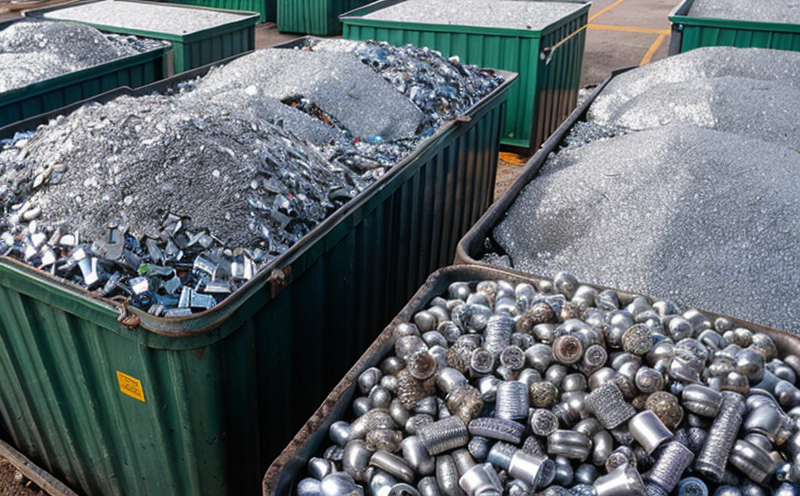ASTM E139 Neodymium in Scrap Alloys
The ASTM E139 test method is a critical tool used to determine the amount of neodymium present in scrap alloys. This test ensures that recycled materials meet quality standards, which is crucial for maintaining consistent performance in various industrial applications.
The process involves several steps. First, the sample is prepared by thoroughly cleaning and cutting it into small pieces, ensuring no contamination from other metals or impurities. The cleaned samples are then subjected to a series of precise measurements using advanced analytical instruments such as Inductively Coupled Plasma Mass Spectrometry (ICP-MS) or X-ray fluorescence (XRF).
The ICP-MS technique provides high sensitivity and accuracy, making it ideal for detecting trace amounts of neodymium. The sample is introduced into the instrument's plasma torch, where it is atomized, ionized, and then passed through a mass analyzer to separate isotopes based on their molecular weight. This allows for accurate quantification of neodymium content.
Alternatively, XRF can be used for preliminary screening or lower precision requirements. It involves exposing the sample to an X-ray source, which causes the atoms in the sample to emit secondary X-rays. The energy and intensity of these emitted X-rays are unique to each element, allowing for identification and quantification of neodymium.
The results from both methods are reported according to ASTM E139 standards, ensuring that the data is consistent and comparable across different laboratories. This standardization is vital in the recycling industry where trace elements like neodymium can significantly affect material properties and performance.
By adhering to these stringent testing protocols, manufacturers can ensure that their recycled scrap alloys meet high-quality standards, thereby enhancing product reliability and customer satisfaction. In addition, compliance with international standards such as ASTM E139 helps companies avoid costly legal issues and maintains a positive reputation in the market.
The importance of this test cannot be overstated. For instance, neodymium is a key component in many high-performance alloys used in aerospace, automotive, and electronics industries. Any variation in its concentration can lead to significant performance discrepancies, affecting product durability and safety. Therefore, accurate testing ensures that recycled materials are suitable for use in these critical applications.
Moreover, the test results play a crucial role in regulatory compliance. Regulatory bodies often require proof of neodymium content as part of their certification processes. By providing reliable data, laboratories like ours help clients meet these requirements and avoid potential penalties or market exclusions.
Benefits
- Ensures compliance with international standards such as ASTM E139.
- Promotes consistency in recycled scrap alloy quality across different batches.
- Aids in maintaining product performance and reliability in critical industries like aerospace and electronics.
- Facilitates regulatory compliance, reducing the risk of legal issues and market exclusions.
In addition to these direct benefits, accurate testing also contributes to sustainability efforts by optimizing resource use and minimizing environmental impact. By ensuring that recycled materials are fit for purpose, this test supports a circular economy model where resources are reused efficiently without compromising on quality.
Why Choose This Test
Selecting the correct testing method is essential when dealing with trace elements like neodymium in scrap alloys. Here’s why choosing ASTM E139 for this purpose is beneficial:
- Accuracy and Precision: The test provides highly accurate results, which are crucial for maintaining consistent quality in recycled materials.
- Standardization: Compliance with international standards ensures that the testing process is universally accepted, enhancing credibility and trust among stakeholders.
- Cost-effectiveness: While initial setup costs may be high, long-term savings can be realized through reduced material waste and improved product performance.
- Regulatory Assurance: Ensures that recycled materials meet all necessary regulatory requirements, thereby minimizing the risk of non-compliance penalties.
Furthermore, choosing ASTM E139 for neodymium testing in scrap alloys offers a competitive edge by demonstrating commitment to quality and sustainability. This can be particularly advantageous when bidding on contracts or seeking new business opportunities within the industry.
International Acceptance and Recognition
- The ASTM E139 standard is widely recognized across North America, Europe, and Asia for its accuracy and reliability in determining neodymium content.
- Laboratories adhering to this standard are trusted partners by many global corporations due to their consistent quality of results.
- Compliance with ASTM E139 enhances the reputation of recycling facilities, making them more attractive to potential clients seeking reliable sources of recycled materials.
The international acceptance and recognition of ASTM E139 extend beyond mere compliance; it also fosters a culture of continuous improvement within the industry. Laboratories that adopt this standard are often seen as leaders in sustainable practices, which is increasingly important given the growing emphasis on environmental responsibility.
Moreover, adherence to this standard allows for seamless integration into global supply chains, facilitating trade and collaboration between different regions. This interconnectedness not only promotes economic growth but also contributes to a more efficient recycling sector that benefits all stakeholders involved.





